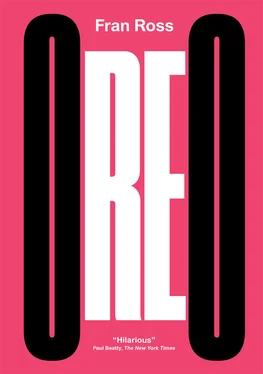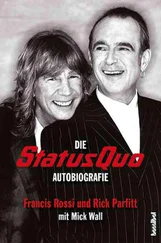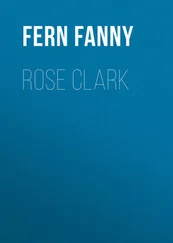Jimmie C. smiled gently, not wanting to offend his friend by telling him he didn’t know what the varnok he was talking about.
“You got a telephone book?” Fonzelle asked.
Jimmie C. handed it to him, and Fonzelle dialed a number. “Hello, Alcoholic Anonymous? Please listen careful, now. Scotch on the rocks, gin and tonic, screwdriver, bloody Mary, muscatel, martini, sneaky Pete—” He doubled up again. “They hung up. I can usually get in about ten of them before they see where I’m coming from.”
Jimmie C. was just about to tell him never to use his phone again for such aglug purposes, when his mother, whom he had not seen for almost a year, walked in.
“ Nu , how’s my baby?” Helen said, embracing him.
Jimmie C. could not even sing, his small body was curbeling so with joy. Such was his curbelation that he did not notice that Fonzelle had said good-bye and was executing a heavy walk, its choreography a combination of Motown and early Clara Ward, out the door.
When Oreo saw her mother, she said, “Later, Mamanyu ,” and went out into the back yard to cry.
When Louise saw her daughter, she said, “Well, I be John Brown! Look who’s yere!” She kissed Helen, pulled her over to James, who grinned and seemed about to get up, and went straight to the kitchen to begin preparing a nice little homecoming meal.
La Carte du Dîner
d'Hélène
Allow 40 min for AMERICAN AND/OR JEWISH dishes.
(Choice of six in each course. No subsitutions.)
Hors d'Oeuvre
halibut imojo
funghi marinati
CHEESE AND CRACKERS
PICKLED HERRING
Leberknödel
sashimi
dim sum
empanadas
pâté maison
vatrushki
Zubrowka
Aquavit
Pepsi
Soupe
mtori
stracciatella
NEW ENGLAND CLAM CHOWDER
MATZO-BALL SOUP
Hühner Suppe
awase miso
yen-wo-t'ang
canja
petite marmite
rassolnik
Amontillado
Madeira
Poisson
samaki kavu
scampi alla griglia
FRIED SMELTS
SMOKED SABLE
Forelle blau mit Kapern
takara bune
hung-shao-yü
pescado yucateco
saumon poché à la Louise
osetrina zalivnaya
1961 Montrachet, Chassagne-Montrachet
Entrée
zilzil alecha
osso bucco
BRAISED SHORT RIBS OF BEEF
STEAMED CALF'S FOOT
Kalbshaxen
tori mushiyaki
fu-chu-jou-pien
matambre
côtes de veau en papillote
shashlyk
1953 Château Pétrus, Pomerol
Rôt
frangainho piripiri
pollo al diavolo
ROAST TURKEY WITH CORNBREAD STUFFING
ROAST CHICKEN GOLDA MEIR
Wiener Gans
yakitori
Pei-ching-k'ao-ya
conejo en coco
faison Souvaroff
kotmis satsivi
1947 Château Margaux, Médoc
Entremets
ovos moles de papaia
gelato torinese
LEMON SHERBET
TSIMMES
Gefülte Melonen
kusamochi
shin-chin-kuo-pin
leche de coco
soufflé glacé Hélène
kisel
1959 Champagne, Veuve Clicquot
Relevé
mokoto
fritto misto
GLAZED HAM
SALAMI SURPRISE MOSHE DAYAN
Sardellenschnitzel
tatsuta age
hao-shih-niu-jou
feijoada
noisettes d’agneau Christine
basturma
1964 Chambertin, Gevrey-Chambertin
Salade
yegomen kitfo
insalata di pomodori
POTATO SALAD
COLESLAW MURRAY
Roter Rübenkren
horenso hitashi
liang-pan-huang-kua
ensalada de nopalitos
salade russe
rossolye
Dessert
cocada amarela
spumoni
APPLE PIE WITH OREO CRUST
HALVAH
Sachertorte
kyogashi
hsing-jen-ping
manjar blanco
Mont Blanc au chocolat du deux Jameses
paskha
1953 Sauternes, Châ Coutet, Barsac
Le thé, Constant Comment
Le café, Chock f ull o’Nuts
Cognac
Calvados
.
What happened while Louise was cooking
Five people in the neighborhood went insane from the bouquets that wafted to them from Louise’s kitchen. The tongues of two men macerated in the overload from their salivary glands. Three men and a woman had to be chained up by their families when they began gnawing at a quincaillerie of substances that wiser heads have found to be inedible. These substances — which blind chance had put within the compass of snatchability of the unfortunate four — ranged from butterfly nuts to galoshes, with a catalog of intervening items that good taste precludes mention of here. In a section of West Philadelphia referred to as “down the Bottom,” at some remove from the Clarks’ neighborhood, a woman who had never laid eyes on Oreo’s family was heard to remark, “That Louise cooking again. Helen must be home. I wish that woman would send out a warning when she gon do this.” And she adjusted her husband’s chains so that they would not rattle against the hot-water pipes and keep her awake all night.
Helen entertains
Helen told the family stories of her life on the road. She acted out all the parts, animate and inanimate (one of her best bits was a bowl of mashed potatoes being covered with gravy). The family favorite that night was the story she told about playing at a house party in the all-black suburb of Whitehall, so much in the news when low-income whites were making their first pitiful attempts to get in. The upper-middle-class blacks of Whitehall objected to the palefaces, not because they were poor (“The poor we have with us always,” said town spokesman, the Reverend Cotton Smith-Jones, rector of St. John’s Episcopal Church), but because they were white (“We just do not want whitey, with his honky ways, around us,” said Reverend Smith-Jones to a chorus of genteel Episcopalian “Amens”). As Smith-Jones pointed out, whitey was beyond help. Chuck did not groove on crime in the streets, the way black people did; he did not dig getting his head whipped, his house robbed, his wife raped, the way black people did; he was not really into getting his jollies over his youngsters’ popping pills, tripping out, or shooting up, the way black people did. Such uptight, constipated people should not be allowed to mingle with decent, pleasure-loving black folk. That was the true story, but officially Whitehall had to be against the would-be intruders on the basis of poverty.
The town adopted a strict housing code, which was automatically rescinded for blacks and reinstated whenever whites appeared. (The code was shredded, its particles sprinkled into confiscated timed-release capsules, and is now part of the consciousness of millions of cold sufferers.) “Keep Whitehall black,” the townspeople chanted in their characteristically rich baritones and basses. “If you’re black, you’re all right, jack; if you’re white, get out of my sight,” said others in aberrant Butterfly McQueen falsettos. These and other racist slogans were heard as the social, moral, economic, and political life of the town was threatened.
The white blue-collar workers who labored so faithfully at the Smith-Jones Afro Wig and Dashiki Co., Inc., were welcome to earn their daily bread in the town, but they were not welcome to bring their low-cholesterol foods, their derivative folk-rock music, and their sentimental craxploitation films to Whitehall. The poor, the white, and the disadvantaged could go jump.
Читать дальше












